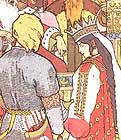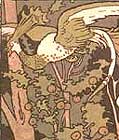


Sixty Folk-Tales From Exclusively Slavonic Sources by A. H. Wratislaw
Return
to
Sixty Folk-Tales
Table of Contents
Croatian
Stories
LIII.
The Daughter of the King of the Vilas
Illyrian-Slovenish
Stories
Introduction
LVII.
The Friendship of a Vila and of the Months
Introduction
to Illyrian-Slovenish Stories
I AM afraid that our delightful friend Oliver Goldsmith has preoccupied the British mind with a certain amount of prejudice against the region,
'Where the rude Carinthian boor
On strangers shuts th’ inhospitable door.'
But if the said rude and inhospitable person had been addressed in a tongue 'understanded of the people,' his reception of the 'Traveller' might possibly have been very different. Be that as it may, the folk-lore tales of the Styrian and Carinthian Slavonians are full of interest, and in them we certainly find the fullest account of the Vilas, and even a Vila marriage with a human being, which ends in an unfortunate separation, like those in Irish legends between mermaids and men. No. 57 gives us a singular variant of 'Cinderella,' in which the circumstances are different down to the conclusion, which is similar to that of the Bulgarian version, No. 37. No. 58 carries us completely into wonderland, where several old acquaintances will meet us in new dresses and relations. In No. 57 we have a singular legend of a white snake, an animal connected with which there are also superstitions in the Scotch Highlands.
The backwardness of the Slovenes is mainly due to the ferocity with which Protestantism was stamped out by Ferdinand II., who, as well as his father, Ferdinand I., wrote his name in blood in the annals of Bohemia. (See Morfill's 'Slavonic Literature,' pp. 176, 177.)
As regards the language, the dual is as fully developed as in Lusatian.
The text came from:
Wratislaw, A. H. Sixty Folk-Tales From Exclusively Slavonic Sources. Boston: Houghton, Mifflin, & Company, 1890.

©Heidi
Anne Heiner, SurLaLune Fairy Tales
E-mail: surlalune@aol.com
Page last updated September 18, 2006
www.surlalunefairytales.com



